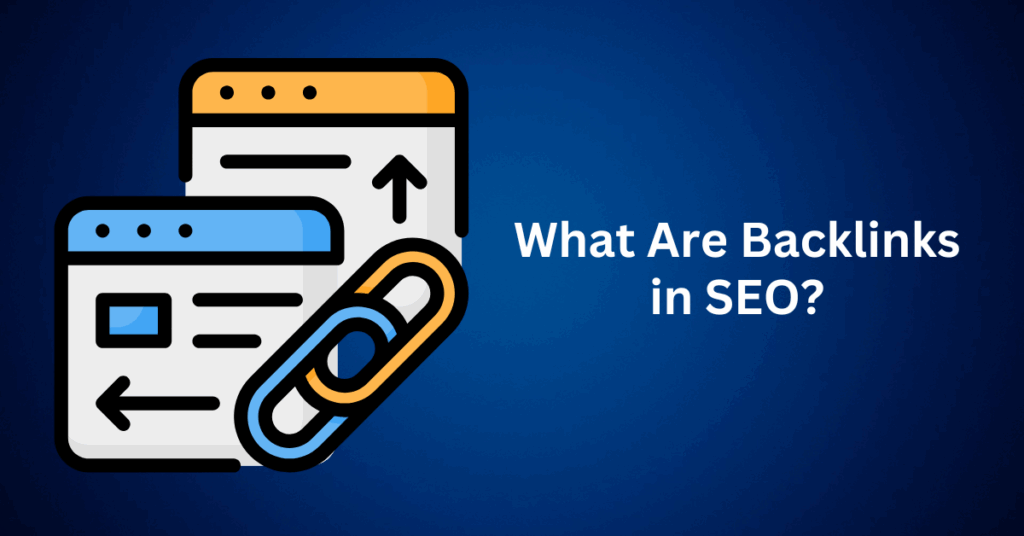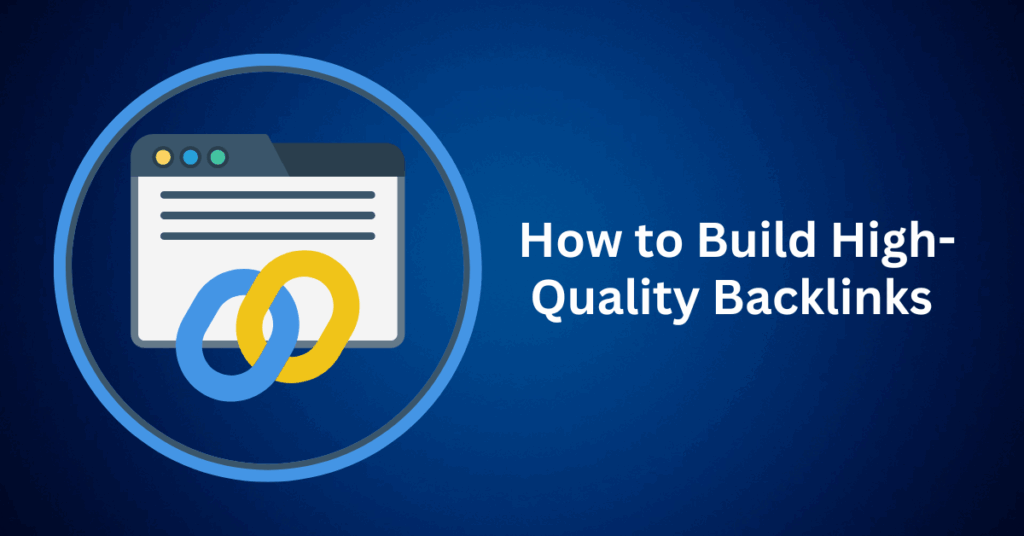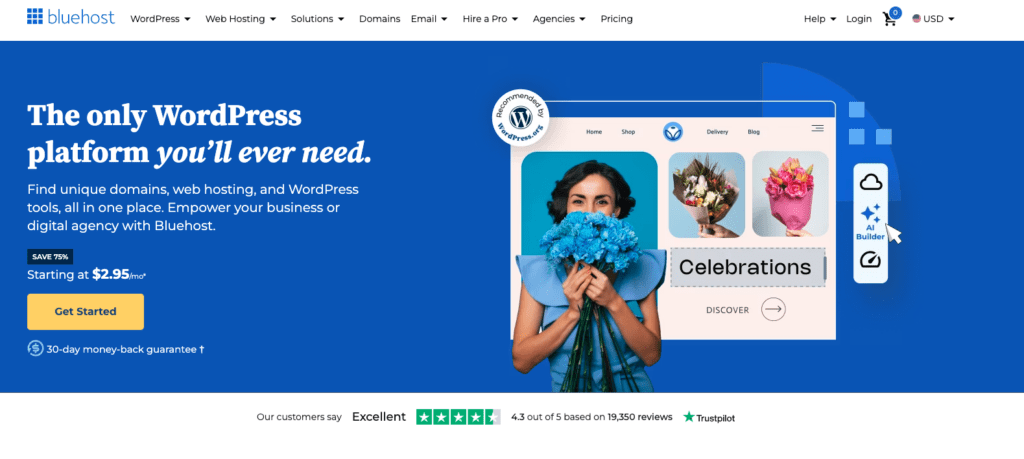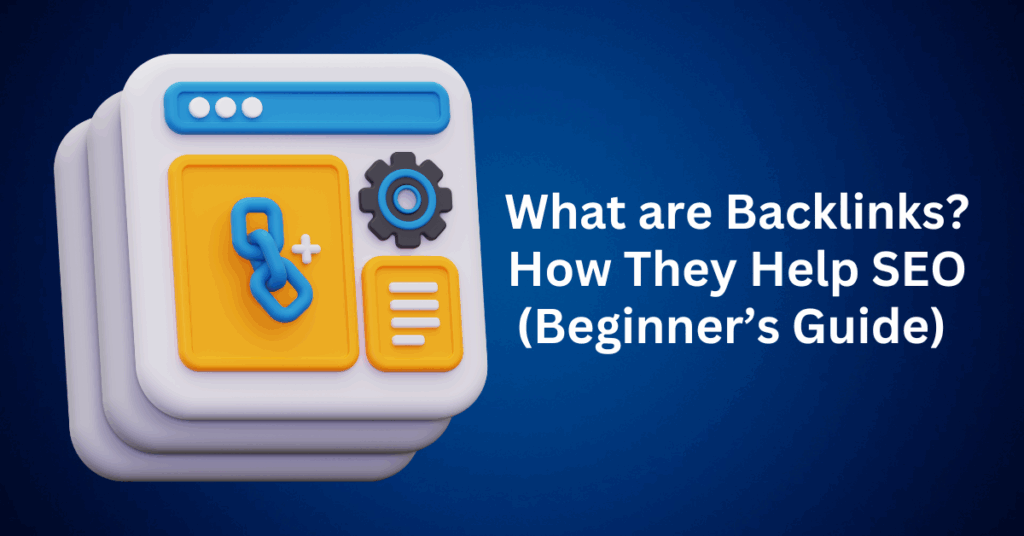If you’ve been consistently creating valuable, well-optimized content but still aren’t seeing the organic traffic you expected, the issue might not be your keywords. Instead, it could be your backlink strategy. While keywords help search engines understand what your content is about, backlinks help them determine how valuable that content is. In fact, backlinks remain one of Google’s most important ranking signals.
But here’s the catch: not all backlinks are created equal. Earning high-quality backlinks takes strategy, patience, and a clear understanding of how they work within the broader SEO ecosystem. Whether you’re managing a personal blog, an eCommerce store, or a service-based website, learning how to build a strong backlink profile is essential for long-term SEO success.
What Are Backlinks in SEO?
A backlink also known as an inbound or external link, is a hyperlink that points from one website to another. These links act as digital endorsements, signaling to search engines like Google that your content is credible, useful, and worth ranking higher in search results.

Think of backlinks as votes of confidence from other websites. When a reputable site links to yours, it tells search engines, “Hey, this content is worth checking out.” The more quality endorsements you have from authoritative sources, the more trust your site builds with search engines.
Why Backlinks Matter in SEO
In the ever-evolving world of SEO, one thing remains crystal clear in 2025: backlinks are still one of the most powerful signals search engines use to rank content. If you’re trying to improve your website’s visibility in Google search results, understanding the role of backlinks is essential.
So, what exactly are backlinks in SEO? Simply put, a backlink is a hyperlink from one website to another. Think of them as digital recommendations, each one telling search engines that your content is credible, useful, and worth sharing. But backlinks do more than boost your reputation; they directly impact your site’s rankings, authority, and organic traffic.
Let’s break down exactly why backlinks are a cornerstone of any successful SEO strategy:
1. Backlinks and Google Rankings: The Power of Link Equity
Search engines like Google rely on complex algorithms to evaluate the quality and relevance of web content. Backlinks play a critical role in that process. When a reputable website links to your page, it essentially vouches for your content. These high-quality backlinks pass “link equity”, a form of SEO currency that helps improve your position in search engine results pages (SERPs).
However, not all backlinks carry equal weight. A link from a well-established site with strong authority (think major publications, industry leaders, or educational institutions) is far more valuable than a link from a low-quality or unrelated site. In short, quality always outweighs quantity.
If you want to rank higher on Google, earning authoritative backlinks should be a top priority.
2. Building Domain Authority and Earning Trust with Backlinks
Domain Authority (DA), a metric developed by SEO software companies like Moz, estimates how likely a website is to rank well in search engines. One of the key factors influencing your DA? Backlinks.
When your website attracts inbound links from respected, trustworthy domains, it signals to Google that your content is reliable. This helps establish your site as an authoritative source in your niche. Over time, consistent link building can boost your overall authority, making it easier to rank for competitive keywords.
If you’re serious about growing long-term organic visibility, focusing on acquiring backlinks from reputable sources is non-negotiable.
3. Driving Qualified Referral Traffic Through Strategic Link Building
Beyond rankings and authority, backlinks offer another huge benefit: referral traffic. Every backlink is a potential pathway for users to discover your website. When your link is placed on a relevant page with an engaged audience, visitors who click through are more likely to be genuinely interested in your content, product, or service.
This kind of traffic is highly targeted and often more likely to convert, whether that means signing up for a newsletter, making a purchase, or contacting you for more information. High-quality backlinks essentially act as free advertising on sites that already attract your ideal audience.
How Search Engines Use Backlinks to Rank Content
Search engines use backlinks as a major trust signal when determining where to rank your website in search results. When multiple authoritative sites link to your content, it signals that your page provides real value. As a result, your chances of ranking on page one significantly improve.

But just as quality links can lift your rankings, poor-quality or irrelevant backlinks can trigger penalties. Search engines are smart. They can detect when links are manipulated or come from spammy networks. This means that earning backlinks naturally, through valuable content and ethical outreach, is the most effective strategy.
Understanding the Different Types of Backlinks and Why They Matter for SEO
Backlinks are a fundamental part of any successful SEO strategy. They act as endorsements from one site to another, signaling to search engines that your content is relevant, trustworthy, and worth ranking. However, not all backlinks carry the same weight or benefits. Depending on the type, a backlink can either boost your rankings, drive quality traffic, or potentially harm your site’s SEO health.
To get the most out of your link-building efforts, it’s important to understand the different types of backlinks and how they impact your site’s visibility in search results.
Common Types of Backlinks and Their SEO Impact
Here’s a quick comparison of the most common backlink types:
| Type of Backlink | Passes SEO Value | Brings Referral Traffic | Easy to Acquire | Risk of Penalty | Boosts Domain Authority |
| Dofollow Links | Yes | Yes | Moderate | Low | High |
| Nofollow Links | No | Yes | Easy | Low | Low |
| Editorial Links | Yes | Yes | Hard | Low | High |
| Paid Links | Limited (if nofollow) | Yes | Easy | High | Low |
| User-Generated Content | No | Yes | Easy | Medium | Low |
Let’s explore what each of these backlink types really means for your SEO.
1. Dofollow Backlinks: The SEO Gold Standard
Dofollow links are the most desirable type of backlink because they pass SEO value, commonly referred to as “link juice” from one site to another. When a high-authority website includes a dofollow link to your content, search engines see it as a vote of confidence. This can significantly improve your domain authority and help your pages rank higher in search results.
Most editorial and contextual links are dofollow by default, unless the website owner manually changes them.
SEO Tip: Prioritize building natural dofollow backlinks from niche-relevant, trusted sites.
2. Nofollow Backlinks: Good for Traffic, Not Rankings
Nofollow links include an HTML attribute (rel=”nofollow”) that tells search engines not to pass link authority. These links don’t directly impact rankings, but they still have value. You’ll commonly find nofollow links in blog comments, press releases, forums, and sponsored content.
While nofollow backlinks won’t improve your site’s authority, they can still drive traffic, boost brand visibility, and diversify your backlink profile, which helps prevent your link-building from looking unnatural.
Use Case: Social media links are nofollow, but they still play a key role in brand awareness and referral traffic.
3. Editorial Backlinks: Earned, Not Asked For
Editorial backlinks are earned naturally when authoritative websites choose to link to your content because it offers value, such as original research, a unique perspective, or helpful resources. These are some of the best backlinks you can get because they signal organic trust and credibility.
Editorial links are almost always dofollow, and they often come from high-authority domains like news outlets, industry blogs, or niche publishers.
Why It Matters: Editorial links are a strong trust signal to Google and often lead to more organic backlinks over time.
4. Paid Backlinks: Risky Business
Paid backlinks are links you purchase through sponsored content, paid guest posts, or advertising. According to Google’s guidelines, any link that’s exchanged for money must be marked with a rel=”nofollow” or rel=”sponsored” tag. Failing to do so can result in penalties or ranking drops.
Although paid links can drive referral traffic, their SEO value is limited, and the risk of getting penalized makes them a less sustainable long-term strategy.
Caution: Always disclose paid partnerships and use the correct tagging to avoid violating Google’s Webmaster Guidelines.
5. User-Generated Content (UGC) Links: Low Value, High Risk
User-generated content backlinks come from content created by other users, like blog comments, online forums, Q&A sites (like Quora), and product reviews. Because these links are easily created, they’re often abused for spam, which is why Google recommends tagging them as rel=”ugc”.
While UGC links can bring some referral traffic, they rarely offer SEO value and can actually harm your backlink profile if they come from irrelevant or low-quality sources.
Best Practice: Monitor and disavow spammy UGC links to protect your SEO.
What Are Toxic Backlinks?
Toxic backlinks are harmful inbound links that originate from low-quality, spammy, or irrelevant websites. These links often violate Google’s Webmaster Guidelines and are seen as manipulative attempts to game search engine rankings. Instead of helping your SEO, they damage your credibility and can lead to ranking drops or even manual penalties.
These links distort your backlink profile and signal to search engines that your content may not be trustworthy, especially if they come from suspicious sources.
Why Toxic Backlinks Are Dangerous for SEO
Backlinks are a cornerstone of Google’s ranking algorithm, serving as third-party endorsements that validate your content. But when those links come from questionable websites, the impact is reversed.
Here’s how toxic links can harm your SEO:
- Lower your site’s domain authority
- Trigger Google algorithmic devaluations or manual actions
- Dilute the trust signals associated with your content
- Reduce organic traffic due to lowered search visibility
In short, ignoring toxic backlinks can sabotage your SEO efforts, no matter how strong your content or on-page optimization might be.
Common Sources of Toxic Backlinks
To effectively clean up your link profile, you need to recognize where harmful links usually come from. Some of the most frequent offenders include:
- Spammy websites: Pages with thin, low-value content created purely for backlink schemes.
- Link farms: Interconnected sites designed solely to generate backlinks without offering genuine value.
- Irrelevant websites: Links from unrelated niches that serve no contextual purpose and signal unnatural behaviour.
- Paid links: Purchased links that violate Google’s guidelines, especially if they aren’t marked as sponsored or nofollow.
- Blog comment or forum spam: Links dropped into irrelevant blog comments or forum threads, often automated and off-topic.
If your site is associated with any of these link sources, it’s time to act.
How to Remove or Disavow Toxic Backlinks
Cleaning up a toxic backlink profile isn’t just good practice, it’s vital for long-term SEO success. Google offers a way to disavow harmful links, essentially telling the search engine to ignore them when evaluating your site.
Here’s how to get started:
1. Identify Toxic Backlinks
Use tools like:
- Google Search Console
- Ahrefs
- SEMrush
- Moz Link Explorer
These tools can help you spot unnatural linking patterns, spammy domains, and potentially harmful backlinks pointing to your site.
2. Reach Out for Manual Removal
If the toxic links are on sites with active webmasters, try contacting them directly and request link removal or to add a rel=”nofollow” tag. While not always successful, it’s worth the attempt, especially if the volume of harmful links is low.
3. Prepare a Disavow File
If you can’t get links removed manually, the next step is to disavow them:
- Open a plain text editor (like Notepad)
- List one domain or URL per line using this format:
domain:example.com - Save the file as .txt using UTF-8 or ASCII encoding
4. Submit the Disavow File to Google
- Go to the Google Disavow Tool
- Choose your verified website
- Upload your disavow file and submit
Once uploaded, Google will gradually process the request, though it can take several weeks to see an impact in rankings or link data.
How to Build High-Quality Backlinks
In the world of SEO, backlinks remain one of the most powerful ranking factors. But not all backlinks are created equal. Building high-quality backlinks, the kind that actually improve your site’s visibility and authority, requires strategy, consistency, and a commitment to ethical link-building practices.

Gone are the days of link farms and shady tactics. In 2025, search engines like Google will reward sites that earn backlinks naturally from trustworthy, relevant sources. So, how do you do it right?
Here are proven, white-hat methods to help you build strong, sustainable backlinks that boost your SEO performance and grow your online authority.
1. Create Link-Worthy Content That Naturally Attracts Backlinks
If you want people to link to your website, give them something worth linking to. Content that is informative, unique, and engaging tends to earn backlinks organically, without outreach or manipulation.
Here are the types of content most likely to attract high-quality backlinks:
- Comprehensive guides and tutorials: Step-by-step resources that walk users through complex processes or topics. The more useful and in-depth, the better.
- Infographics and visual content: Easy-to-digest visuals that summarize data, explain ideas, or illustrate trends. These are highly shareable and often embedded with backlinks.
- Original research and case studies: Data-backed content or real-world results based on your own findings. This type of content establishes authority and is frequently cited by others in your industry.
- Expert roundups and interviews: Content that includes insights from thought leaders in your field can be widely shared and linked to by contributors and their audiences.
By focusing on content that solves problems, answers key questions, or delivers value in a unique format, you’ll naturally attract backlinks over time, without needing to chase them.
2. Leverage Guest Blogging and HARO for Strategic Backlink Building
Outreach-based link-building can be incredibly effective if done the right way. Two of the most powerful tactics are guest blogging and HARO (Help a Reporter Out).
Guest Blogging: Pitch well-researched, relevant articles to authoritative websites in your industry. When you contribute high-quality content, you typically receive a backlink in return (often in the author bio or within the article body).
Best practices:
- Only write for sites with strong domain authority and real audiences.
- Avoid spammy or irrelevant guest post farms.
- Keep content useful, original, and aligned with the site’s audience.
HARO Outreach: HARO connects journalists with expert sources. By responding to media requests with valuable insights, you can earn backlinks from credible outlets like Forbes, Business Insider, and other top-tier publications.
Tip: Respond promptly and offer unique, expert commentary to increase your chances of getting quoted—and linked.
Both strategies are relationship-driven and help establish your brand as a trusted voice in your field while earning authoritative backlinks in the process.
3. Reclaim Lost Backlinks and Spy on Competitor Link Strategies
Not all link-building has to start from scratch. Two often-overlooked methods such as link reclamation and competitor analysis can help you uncover quick wins and valuable opportunities.
Link Reclamation: Over time, you may lose backlinks due to content updates, broken pages, or website changes. You can also miss out on links when your brand is mentioned without a hyperlink.
What to do:
- Set up Google Alerts to monitor brand mentions.
- Use tools like Ahrefs, Semrush, or BuzzSumo to identify lost or unlinked mentions.
- Reach out to site owners and politely request a link addition or fix.
Competitor Backlink Research: Analyzing your competitors’ backlink profiles can reveal where they’re earning links and give you ideas for how to replicate their success.
Steps:
- Use backlink analysis tools (like Ahrefs or Semrush) to find your competitors’ top-performing pages.
- Identify which websites link to them.
- Reach out with better content, expert input, or collaboration ideas to secure your own link.
These strategies are powerful because they target websites that are already open to linking to content like yours.
How Bluehost Hosting Helps You Build a Link-Worthy Website That Ranks
If you want your website to rank higher on Google, earning backlinks, especially from authoritative sources, is non-negotiable. But attracting quality links takes more than publishing great content. Your website must be fast, secure, and optimized from the ground up for SEO performance. That’s where Bluehost comes in.

Whether you’re a blogger, small business owner, or eCommerce entrepreneur, Bluehost gives you the foundational tools, performance, and expert support to create a website that earns trust, ranks well, and naturally attracts valuable backlinks.
Below, we’ll explore how Bluehost hosting helps you build a site that’s truly worth linking to.
1. Hosting That Fuels Backlink Growth
Choosing the right hosting platform is critical for long-term SEO success. Bluehost offers a range of hosting solutions, including WordPress Hosting, Cloud Hosting, and eCommerce-optimized plans. Each designed to support faster loading times, top-tier security, and optimal uptime.
Bluehost WordPress-optimized hosting is perfect for content creators, service providers, and solopreneurs who want to grow their online presence. These hosting environments are configured for speed and SEO, giving your content the technical edge it needs to get noticed and linked to by others.
From fast page load times to pre-installed SEO tools, Bluehost WordPress Hosting lays the groundwork for better search engine rankings and by extension, more backlinks from blogs, forums, and news sites.
If you are running an online store, Bluehost’s eCommerce Essentials and Premium plans, powered by WooCommerce, are tailor-made for selling and ranking. With built-in SEO capabilities and secure payment integrations, these plans help you attract backlinks from product reviewers, niche marketplaces, and influencers in your industry.
Whether you’re launching a new product or optimizing category pages, our hosting environment supports the kind of SEO signals that draw high-quality inbound links.
2. Built-In SEO Tools That Help You Rank and Get Linked
Backlinks are one of the strongest indicators of trust to search engines, but to earn them, your site needs to be discoverable and well-optimized. That’s why every Bluehost plan includes powerful SEO tools designed to help you climb the rankings and appeal to backlink sources.
Every Bluehost WordPress site comes with Yoast SEO, a leading SEO plugin that simplifies keyword targeting, meta descriptions, readability, and structured data. These optimizations make your pages more attractive to Google and more likely to be cited by other websites with dofollow backlinks that pass link equity.
Bluehost WooCommerce hosting includes specialized tools like Yoast WooCommerce SEO, which helps you fine-tune product titles, descriptions, and schema markup. For even more backlink opportunities, the eCommerce Premium plan adds Yoast Video SEO and Yoast News SEO to expand your visibility in video and news-specific search results.
3. Site Performance and Security That Build Trust
Link-worthy websites don’t just look good. Instead, they perform flawlessly and protect user data. That’s why search engines and other websites favour fast, secure sites when deciding where to link.
With Bluehost’s cloud hosting and SSD-powered servers, you get lightning-fast load times and reliable uptime, even during traffic surges. Our integration with Cloudflare CDN enhances performance across global locations, delivering a seamless experience for your visitors and encouraging backlinks from international sources.
Search engines reward fast websites with better rankings, and site owners are more likely to link to a site that loads quickly and stays online consistently.
Besides, every Bluehost plan includes a free SSL certificate, safeguarding your users’ data and helping you build credibility with both audiences and search engines. We also partner with SiteLock to provide malware protection, firewalls, and DDoS defense.
Plus, CodeGuard automatic backup system ensures your site data is safe and restorable, minimizing the risk of losing SEO equity due to site outages or corruption.
4. 24/7 Expert Support for Seamless Optimization
Technical issues shouldn’t stand in the way of your SEO strategy. That’s why Bluehost offers 24/7 support from WordPress-trained professionals who can help with plugin conflicts, performance tuning, and SEO settings.
Whether you’re troubleshooting a drop in rankings or optimizing your homepage for backlinks, our team is here to support you every step of the way.
Final Thoughts: Build a Backlink Strategy That Works
Backlinks remain one of the most influential ranking factors in search engine optimization. When high-quality websites link to your content, it signals to search engines that your site is trustworthy, relevant, and authoritative, earning you higher visibility in search results.
But attracting valuable backlinks doesn’t happen by chance. It starts with building a website that deserves them.
By focusing on performance, security, and on-page SEO, you create a strong foundation that naturally draws links from credible sources. A well-optimized site not only improves user experience but also strengthens your domain authority and boosts your chances of ranking on page one.
If you’re serious about elevating your SEO strategy, it’s time to invest in infrastructure that supports long-term link-building success.
Get started with Bluehost WordPress Hosting. A reliable, SEO-friendly platform trusted by over 5 million users. Create a high-performing website that earns backlinks, ranks better, and drives real results.


